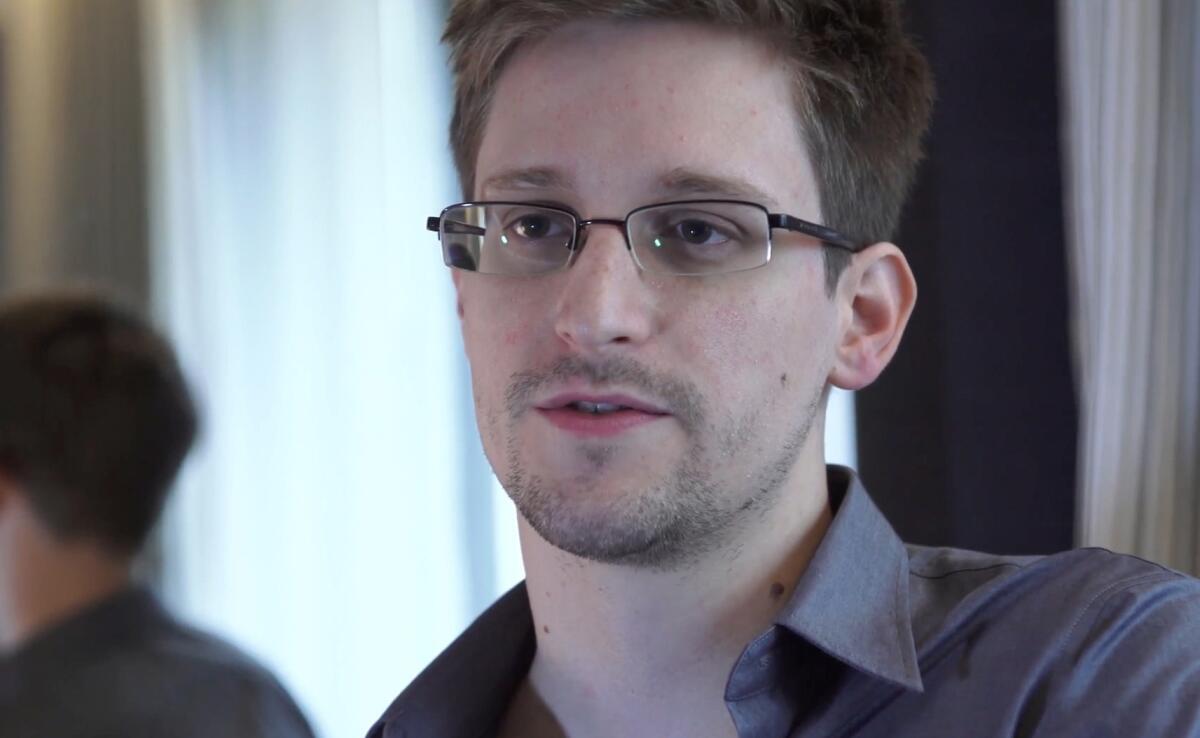Newsletter: Opinion: Snowden and Silicon Valley, scapegoats for Paris

Edward Snowden in Hong Kong in July 2013. Glenn Greenwald, a journalist to whom Snowden made his disclosures, writes that the CIA is smearing Snowden and Silicon Valley in the wake of the terrorist attacks.
Good morning. I'm Paul Thornton, The Times' letters editor. The American turkey population is now 45 million birds fewer than it was a few days ago. Here's a look back at the week in Opinion.
It was the question many were thinking and some were eager to ask: If Edward Snowden hadn't leaked all that information about U.S. government surveillance programs in 2013, would terrorists have been able to carry out the attacks in Paris two weeks ago?
Glenn Greenwald, a journalist to whom Snowden made his disclosures and who first wrote about the government spying programs in the Guardian, took to The Times' Op-Ed page this week to slam the CIA, saying it was smearing Snowden and Silicon Valley in the wake of the terrorist attacks. He wrote:
Decent people see tragedy and barbarism when viewing a terrorism attack. American politicians and intelligence officials see something else: opportunity.
Bodies were still lying in the streets of Paris when CIA operatives began exploiting the resulting fear and anger to advance long-standing political agendas. They and their congressional allies instantly attempted to heap blame for the atrocity not on Islamic State but on several preexisting adversaries: Internet encryption, Silicon Valley's privacy policies and Edward Snowden.
The CIA's former acting director, Michael Morell, blamed the Paris attack on Internet companies "building encryption without keys," which, he said, was caused by the debate over surveillance prompted by Snowden's disclosures. Sen. Dianne Feinstein (D-Calif.) blamed Silicon Valley's privacy safeguards, claiming: "I have asked for help. And I haven't gotten any help."
Former CIA chief James Woolsey said Snowden "has blood on his hands" because, he asserted, the Paris attackers learned from his disclosures how to hide their communications behind encryption. Woolsey thus decreed on CNN that the NSA whistleblower should be "hanged by the neck until he's dead, rather than merely electrocuted."
In one sense, this blame-shifting tactic is understandable. After all, the CIA, the NSA and similar agencies receive billions of dollars annually from Congress and have been vested by their Senate overseers with virtually unlimited spying power. They have one paramount mission: find and stop people who are plotting terrorist attacks. When they fail, of course they are desperate to blame others.
The CIA's blame-shifting game, aside from being self-serving, was deceitful in the extreme. To begin with, there still is no evidence that the perpetrators in Paris used the Internet to plot their attacks, let alone used encryption technology.
CIA officials simply made that up. It is at least equally likely that the attackers formulated their plans in face-to-face meetings. The central premise of the CIA's campaign — encryption enabled the attackers to evade our detection — is baseless.
Donald Trump is still here, and he's more Trumpian than ever. Columnist Doyle McManus writes that we owe his continued ascendancy to fear and anger: "Trump is still a long way from becoming his party's presidential nominee, but by all logic, he shouldn't even be this close. This campaign, however, hasn't been governed by logic; it's been governed by anger and fear." Separately, editorial writer Scott Martelle says Trump's increasingly threatening rhetoric lately has coincided with apparently race-motivated violence and intimidation at Black Lives Matter protests and mosques.
"Microaggression" moaners, meet Ralph Ellison. The late African American novelist, writes Jonathan Zimmerman, insisted that "blacks' survival in the face of discrimination and hatred demonstrated their strength and character." It's likely his assessment of the protests over racism on college campuses today, which focus partly on the perceived psychological harm of everyday slights, would be less than favorable, says Zimmerman. L.A. Times
Why are some people homeless? Ask homeless people. A grimly fascinating Los Angeles Homeless Services Authority survey of some of the city's homeless population provides a window on how some of the people who live on the streets believe they got there. Among the reasons: "People are creeps," "hates Montana's weather" and "raped." The Times' editorial board ends its editorial on the survey prescriptively: "Many Angelenos will spend a portion of their Thanksgiving — commendably — volunteering at soup kitchens and homeless shelters. But they could help homeless people more by supporting local county and city government efforts to establish the safe parking programs, storage facilities and permanent supportive housing needed in all of our communities. Let's prove that people are not creeps." L.A. Times
Black Friday borders on a public health emergency, with price-conscious shoppers having been trampled, pepper sprayed and even killed in the stampede for immediate post-Thanksgiving deals. Columnist Meghan Daum has a solution, one that further blurs the line between Black Friday and Thanksgiving but without forcing people to miss out on the year’s biggest meal: "We should do what the pragmatic Pilgrims would have done had smartphones been around during the first Thanksgiving: Let everyone do their online shopping at the table. Not only is this efficient and cost-effective, it discourages family arguments by discouraging conversation altogether." L.A. Times
Work off one or two of those Thanksgiving calories. Type an email with your thoughts and feedback and send it to paul.thornton@latimes.com.
Sign up for Essential California
The most important California stories and recommendations in your inbox every morning.
You may occasionally receive promotional content from the Los Angeles Times.







